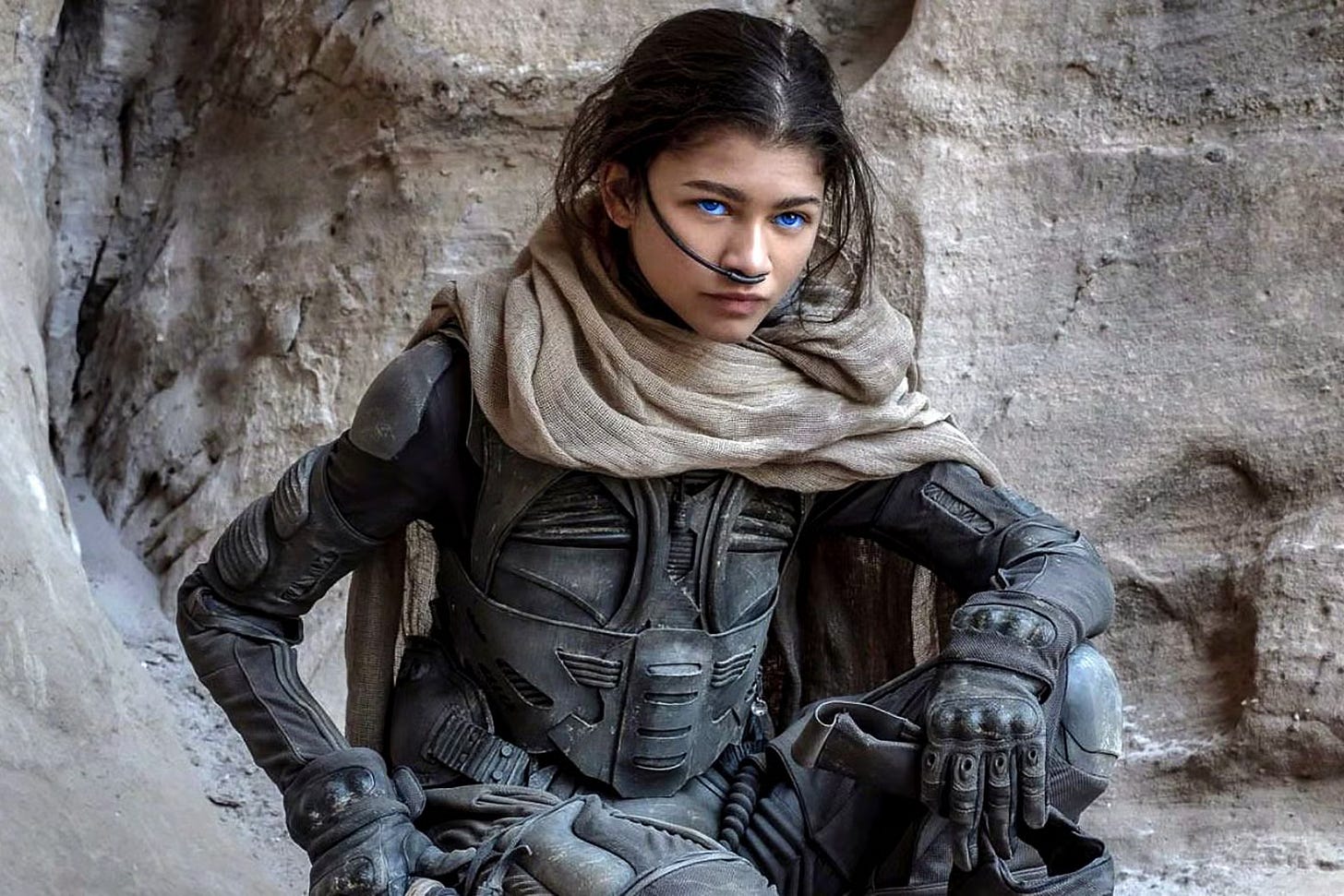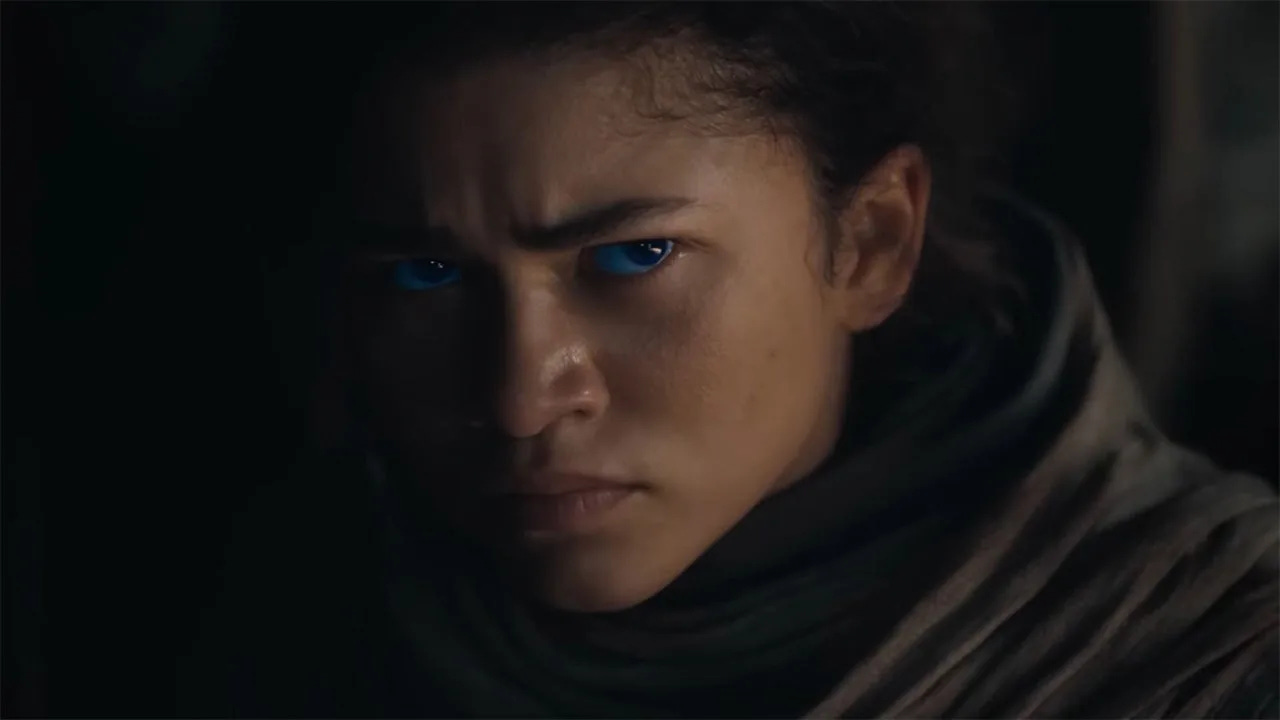Dune's Chani – a character lost in attempts to evolve with the times.
Yesterday, I went to re-watch Dune 2 in the theatres again. It brought back all the emotions I had felt when I first watched the film. Overall, Dune’s sequel is a stunning experience. Denis Villeneuve has done a sublime job demonstrating his expertise with the visual medium, bringing the story of the novel to the screen beautifully.
But there is one aspect of the film that is painfully hard to ignore for almost anyone who has read the book - Chani. Chani in the books is the daughter of Liet Kynes. Kynes is the imperial planetologist/ecologist of Arrakis and the secret leader of the Fremen at the time House Atreides took control of Arrakis.
Kynes in the novel is motivated by his father’s ambitions of terraforming Arrakis, from the harsh desert it was to a green and temperate world. Kynes’s father is depicted as a simple man, someone who only cares and understands the dream of the ecological transformation of the planet and nothing beyond.
Kynes however does not suffer from such a myopia and is aware of the politics surrounding this dream of transformation and is actively participating in it albeit on individual terms. Chani of the books is aware of these facts and shares her father's dream. Her character in the novel has a deep connection to her lineage, the Fremen's way of life, and the ecological vision of Arrakis. She is depicted as an intelligent and resourceful character who understands and can anticipate the sacrifices required to achieve such large ambitions.
However, when it comes to Chani of the films, the character feels to have been reduced to a modern-day feminist icon. Repeated displays of immaturity, heedlessness and emotional volatility are presented as characteristics necessary to add a voice and agency to her character, something perceived as lacking in the book and crucial to morph her into a more active part of the story.
Instead, the film version presents a rebellious and temperamental character with short-sighted motivations which ultimately serves as a shallow interpretation of the character. Although the film is littered with instances of deviations from the novel’s character, two, in my view, are significant and demonstrate this fact well.
First is Chani’s reaction to Paul drinking the water of life. In the book when Chani finds out that Paul has drunk the Water of Life and that she could potentially lose him, she demonstrates incredible control over her emotions, she is gracefully reserved and brave she doesn’t succumb to the moment and remains resolved despite her fear of Paul’s death and willingly brings him back to life. She is stoic, so stoic that Jessica takes notice of it and likens her behaviour to a Bene Gesserit, a skillset that requires years of training.
Whereas in the film, Chani on learning of Paul’s death, displays no remarkable control of her emotions, she is vindictive towards Jessica and refuses to understand the gravity of the situation in front of her. She is shown to engage in physical violence against Paul which under the circumstances appears heedless and tactless. The vulnerability and deep faith Paul and Chani share in the novel is somehow completely lost in the films. Instead, Chani’s actions are entirely dictated by self-interest and her ideological beliefs.
Something similar is again echoed in Chani’s reaction to Paul’s marriage proposal to Irulan. In the book, this is almost obvious to Chani. She is anticipating this event, knows its significance and is aware of the political motivations behind it. She is shown not only to understand the necessity of this personal sacrifice but also to understand the burden placed on Paul’s shoulders and just like him is willing to weigh the cost of a personal sacrifice in the short term against the benefit of the Fremen for the future, without losing faith in the integrity of her relationship with Paul.
On the other hand, Chani in the film is shown to be entirely taken aback by this decision, visibly hurt, and eventually chooses to abandon the scene. Her character in the film considers the announcement a betrayal despite Paul’s many assurances beforehand. Yet again, the bigger picture, at least in the moment, is almost entirely lost on her. She chooses to see nothing beyond her motivations.
Such modernisation of female characters and introduction of so called subtle changes to have them evolve with the times is caustic to the integrity of the originally very well-written and poignant characters. It is deeply saddening that Chani is seen as a passive character in the book, so much so that it warrants losing the essence of her character entirely to have the character fit with the times.
It's interesting to note that none of the male characters warranted a change so drastic. What might be construed as subtle changes to a single character end up having a ripple effect across the entire plot and slightly alter the perception of every other character that encounters Chani. Filmmakers must remain wary of making such changes to “fit the times” and understand they are, in the end, entirely unnecessary and arguably counterproductive.






